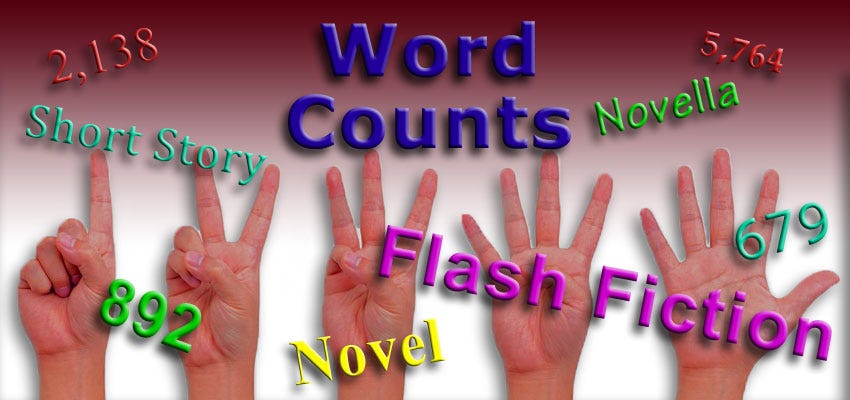Do Word Counts Matter?
The obsession over word counts has taken over from concern for the craft of writing.
Authors are constantly posting about their word counts, but how much does it matter? They say, “Today, my goal is to write 2,000 words” (or some such number). They never say, “Today, I’ll get my hero out of that tricky spot I left her/him in” or “Today, I’ll fill up those plot holes” or other expressions dealing with the content of their writing. It seems that the obsession over word counts has taken over from concern for the craft of writing – quantity winning out over quality. Time to reacquire some perspective.
When Word Counts Don’t Matter
The best time not to worry about word counts is when the creative Muse hits you. Just sit with pen, pencil, or keyboard and have at it. Focus on the plot, the action, the characters, the scenes – in short, the quality of your writing. Forget the word counts. Forget those writing challenges on social media to write a book in a month. Let the Muse within you do its stuff. We are adults who no longer need homework assignments to fire up our creative juices.
When Word Counts Do Matter
The work of fiction is done. Your hero has saved the day, your loving couple has finally recognized that love, and the criminal has been caught. Now you can worry about your word count, especially if you want to submit that work to a publisher or enter it into a contest. (Different sites have different standards, and you’ll want to check with them before submitting.)
This chart is a rough guide, combining two charts seen on Reedsy and Kindlepreneur:
As you can see, your word count determines into which category your work belongs. Frankly, the word count for novels above seems a bit low. Most publishers want 80,000 to 90,000 as a minimum.
And if you’re writing non-fiction, the standards can be rather different.
On a Personal Note
I served as blog editor (and main contributor) for two companies over the course of ten years. The contributors were told that their submissions should be 300-500 words (the companies had set that standard and wanted me to stick with it). Sadly, the stuff I was sent was often “padded out,” using five words when two words would have sufficed or including unrelated anecdotes about their pets or a neighbor. This is the sort of thing kids did in school when they were assigned the task of writing a 200-word essay (mine were usually a lot longer, which the teacher also didn’t like). I had to reject a few submissions here and there because of this.
The point is to write what you need in the best-crafted way possible instead of trying to meet that word count minimum (or even hold to a maximum). In fact, two small publishers told me not to worry that my manuscripts were well over the 100,000 threshold many publishers set as a maximum.
Final Note
Set aside the worry over how many words you have done. Instead, focus on how well you have described a scene or portrayed the action or conveyed a mood. Quality over quantity!
Hope you found this helpful and have been inspired to start and/or continue writing!
Please check out my works in progress (WIPs). And thanks for reading.
Disclaimer: I get no compensation for links in this post or on my site to other sites and/or products.





Writing to me is a form of exercise. When writing articles I would strive to write at least a thousand words. Having longer essays forces the brain to work harder and over time such exercise is necessary to cultivate the mind to be creative to explain things more eloquently. But when writing for work, it is the opposite. I won't write a fifty words when I can put the message across clearer in ten.
I never start writing a story with a word count in mind. It will be as long or as short as it needs to be. Whatever feels natural. People often tell me "the story is too short, you should expand it, add to it." Sorry, folks, it doesn't work that way for me... What's funny is the books always land in that 85K spot. I don't know why that happens...